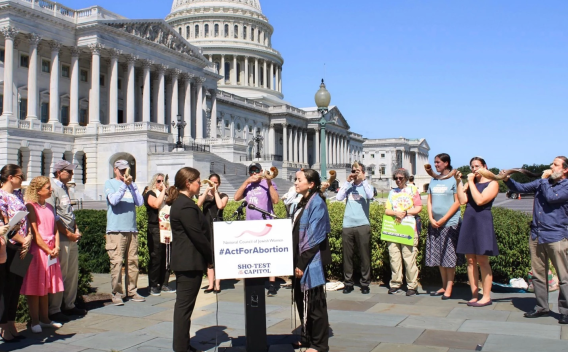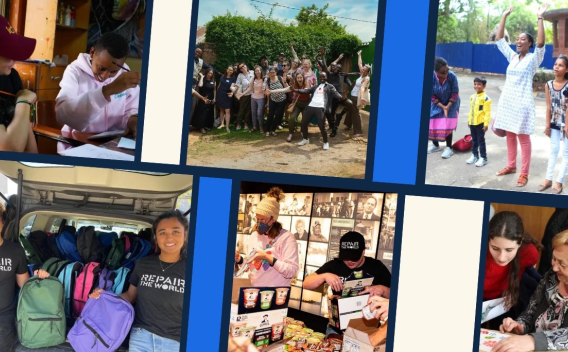By
Published
October 14, 2020
Tags
If ever the moment were ripe for contributing to efforts to heal the world, it is now. Amid the global pandemic, massive unemployment and a racial reckoning, millions of young adults are yearning for ways to feel useful and help people who are struggling.
As these crises emerged, Cindy Greenberg, CEO of Repair the World, said “we saw a huge opportunity to tap all the energy and skills of young people to meet the unprecedented needs of their communities.”
The Jewish Service Alliance, which is powered by Repair the World and represents more than 40 national Jewish organizations, is committed to prioritizing service in the coming year. One of its initiatives, Serve the Moment, has been matching hundreds of young volunteers with organizations fighting hunger, poverty, educational inequity and social isolation.
Starting in June, the program’s first 100 volunteers spent four weeks doing jobs such as delivering food, tutoring low-income children and helping people file for unemployment assistance. Benefits flowed to both givers and receivers, including the following four hard-working Gen Z volunteers and a Millennial supervisor.
Structure in a Time of No Structure
In Cleveland, Anna Lowenstein (she/her), who had just finished a master’s degree in social work, had looked forward to leading a Birthright trip over the summer. Then all trips were canceled. As Anna watched all the other ways people’s lives were being disrupted by COVID-19, she said, “I wanted to do something to help, but I didn’t know how.”
Anna, 25, read about Serve the Moment on a Facebook page for young Jewish leaders and signed up with her younger sister, Dorothy, 21. The two worked on projects that included teaching creative writing on Zoom to 4th to 10th-grade students, with a nonprofit called Lake Erie, Inc.
They also helped with a large project that asked Cleveland-area residents to send in photos, comics and writing for a single prompt: “One summer’s day….”
“We got dozens of responses which we posted on a store window in our town as a way to tackle social isolation,” Anna said.
Serve the Moment was a “perfect fit” for the sisters, added Anna, 25. “It was structure during a time of no structure. I learned a lot about myself and how I want to be spending my time. The service lifted me up; I felt fulfilled and energized every single day.”

Sisters Anna and Dorothy Lowenstein walk giant pencils over to a creative storefront display, a project to help bring joy and meaning to their community.
(Photo Credit: Amy Rosenbluth)
Leaving the Bubble from Behind a Desk
In Chicago, Molly Rosen (she/her), 21, who is studying playwriting at DePaul University, had enrolled as a summer intern at a theater company. But COVID-19 squelched her plan after performances were canceled. (One recent survey suggests roughly a third of internships have been canceled this year.)
“I was pretty stressed out,” Molly acknowledged. “I’d spent last summer floating around, doing babysitting, and was really hoping I’d be doing something more meaningful and productive this year.”
Molly also worried that she’d have a harder time returning to college in the fall if she hadn’t made more use of her brain over the summer. When her older sister forwarded an email about Serve the Moment, she wasted no time in signing up.
Her assignment was to do administrative work for I Grow Chicago, a nonprofit providing programs including tutoring, workforce training and urban farming. She spent her time analyzing surveys and writing a blog for the program’s website.
Molly asked for work that wouldn’t put her at risk of the virus and said she appreciated being able to do her job remotely. Yet even working at a desk helped draw her outside of her normal bubble, she said, as she learned about the urgent needs of communities so close to her campus.

Chicago theater student Molly Rosen learned about the day-to-day needs of her neighbors by reaching out online.
(Photo Credit: Molly Rosen)
Building a Community—Remotely
Dani Brooks (they/them), who is pursuing a master’s degree in public health at Boston University, had just started looking for an internship last spring when the pandemic began. But Dani, 25, found only a part-time position, leaving them with a lot of free time and a longing to be of more use.
Serve the Moment assigned them to a group called The Neighborhood Developers, which works on housing issues. Dani answered calls to a busy hotline for Boston residents who had recently lost jobs and needed help filling out rental assistance applications. “It was very eye-opening to realize how much paperwork you have to fill out,” Dani said. "It was hard enough for me; I could just imagine how hard it would be for someone doing it for the first time and trying to keep a family together."
Dani’s parents taught them to value community service. "It's the way I feel most connected to Judaism," they said, citing the Pirkei Avot teaching that you’re not obliged to finish the work, but neither are you free to neglect it.
Dani did all their work by Zoom, since they didn’t have a car and didn’t feel safe taking public transportation. They also met with other Serve the Moment volunteers by Zoom, appreciating the close friendships that formed even without in-person meetings.
Cultivating Solutions to End Hunger
In suburban Detroit, Julia Cunnien (she/her), 21, who is studying environmental science at the University of Michigan, had hoped to be a counselor at a summer camp, a job she’d dreamed of ever since she was a camper. The camp closed, but with Serve the Moment Julia still managed to spend the summer weeks outdoors, planting, weeding, and harvesting at the communal garden run by Yad Ezra, Michigan’s only kosher food pantry.
Julia worked four days a week in the garden, usually by herself. She was particularly impressed by how many loads of zucchini, okra, tomatoes and squash Yad Ezra managed to produce from raised beds in front of a busy street and in several small lots surrounding the pantry, which serves about 1,300 families a month. “The Jewish community will always find ways to help others—especially in the midst of a pandemic,” she said.

University of Michigan undergrad Julia Cunnien couldn't be a camp counselor last summer, due to the pandemic, but she got outside and served her community as a garden volunteer
(Photo Credit: Julia Cunnien)
Teaching—and Learning—on the Job
Midway through the summer, Daniel De Boulay (he/him), 24, a social activist and graphic designer, was hired as a Serve the Moment city coordinator in Brooklyn. His tasks were to manage 14 volunteers and provide weekly education on issues such as “food justice, criminal justice, almost any noun with ‘justice' after it,” as he explained. Over the next several weeks, he said he watched the group mature from coping mainly with the most urgent new needs, such as food banks, to spending more time on evolving issues such as tutoring for low-income students. “It was my first time working with a Jewish organization,” De Boulay said. “When you grow up in New York, you’re tangentially aware of Jewish customs, but then you realize how much you don’t know.”

City Coordinator Daniel De Boulay manages Serve the Moment volunteers and provides weekly learning opportunities. (Photo Credit: Daniel De Boulay)
The Moment Continues
Serve the Moment is open to anyone, aged 18 to 29, and to Jews and non-Jews alike, although the vast majority of volunteers so far have identified as Jewish. Some 240 young adults have been accepted into a 10-week, full-time program for the fall. Applications are still open for the winter.
“This Summer Will Scar Young Americans for Life,” read a recent headline in The Atlantic. But maybe not these young adults. “There is so much research that shows that members of Generation Z care deeply about social justice, and we are certainly seeing that now,” said Greenberg.
Volunteers can sign up for a wide range of opportunities, from occasional service to full-time positions, at https://servethemoment.org.





